ADJECTIVES for Class 10 ENGLISH
What is an Adjective?
An adjective is a word that describes a noun or a pronoun in a sentence.
विशेषण वह शब्द है जिसका प्रयोग संज्ञा या सर्वनाम की विशेषता बताने के लिए किया जाता है।
Examples
1) Ram is fat. (Here Ram is a noun and the word 'fat' is an adjective because that word is describing Ram that he is fat.)
राम मोटा है I (यहाँ पर राम एक संज्ञा है और ‘मोटा’ शब्द विशेषण है क्योंकि वह शब्द राम की विशेषता बता रहा है कि राम मोटा है।)
2) This is a red pen. (Here pen is a noun and the word 'red' is an adjective because that word is describing the characteristic of pen that the pen is red in colour.)
यह एक लाल कलम (pen) है I (यहाँ पर कलम एक संज्ञा है और ‘लाल’ शब्द विशेषण है क्योंकि वह शब्द कलम की विशेषता बता रहा है कि कलम लाल रंग का है।)
Types of Adjectives
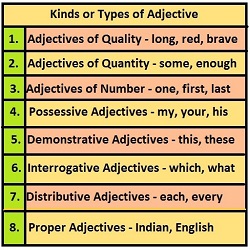
There are 10 types of adjectives.
1. Adjectives of quality (गुणवाचक विशेषण)
2. Adjectives of quantity (परिमाणवाचक विशेषण)
3. Adjectives of Number (संख्यावाचक विशेषण)
4. Demonstrative Adjectives (संकेतवाचक विशेषण)
5. Distributive Adjectives (विभागवाचक विशेषण)
6. Interrogative Adjectives (प्रश्न वाचक विशेषण)
7. Possessive Adjectives (अधिकार सूचक विशेषण)
8. Emphasizing Adjective (बल सूचक विशेषण)
9. Proper Adjectives (व्यक्तिवाचक विशेषण)
10. Exclamatory Adjectives (विस्मयबोधक विशेषण)
1) Adjectives of Quality (गुणवाचक विशेषण)
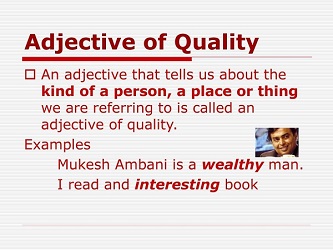
This type of adjective shows the quality of a person or thing.
वैसा विशेषण जिससे किसी व्यक्ति या वस्तु के गुण का पता चलता है उसे गुणवाचक विशेषण कहते है।
Examples
1) Kundan is a good boy.
1) कुंदन एक अच्छा लड़का है।
2) Sita is beautiful.
2) सीता सुंदर है।
2) Adjectives of Quantity (परिमाणवाचक विशेषण)
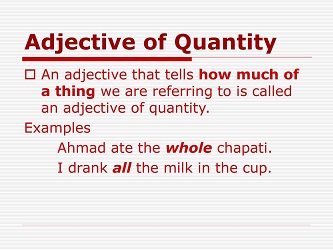
Types of adjectives that show the quantity of noun is called adjectives of quantity.
वैसा विशेषण जिससे मात्रा का पता चलता हो, उसे परिमाणवाचक विशेषण कहते है।
Examples
1) He had no water.
1) उसके पास पानी नहीं था।
2) He has enough money.
2) उसके पास पर्याप्त पैसा है।
3) Adjectives of Number (संख्यावाचक विशेषण)
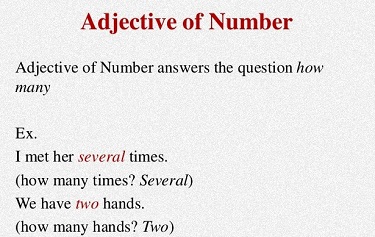
This type of adjective shows the number of person or thing. For Example- one, two, three, etc.
वैसा विशेषण जिससे किसी व्यक्ति या वस्तु के संख्या का पता चलता है उसे संख्यावाचक विशेषण कहते है, जैसे एक, दो, तीन आदि।
Examples
1) I have some mangoes.
1) मेरे पास कुछ आम हैं।
2) We have two legs.
2) हमारे दो पैर हैं।
4) Demonstrative Adjectives (संकेतवाचक विशेषण)
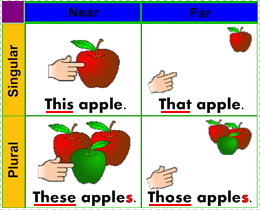
The adjective used to point out some person or thing is called a demonstrative adjective.
जिस adjective का प्रयोग व्यक्तियों या वस्तुयों को सूचित करने के लिए किया जाता है, उसे demonstrative adjective कहते है I
Examples
1) This pen is mine.
1) यह कलम मेरी है।
2) I did not like that man.
2) मुझे वह आदमी पसंद नहीं आया।
5) Distributive Adjectives (विभागवाचक विशेषण)
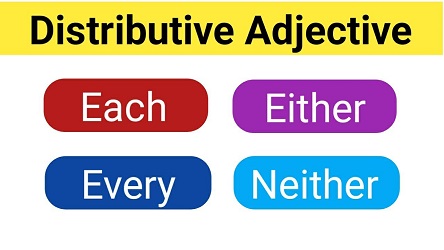
Each, every, either and neither are called distributive adjectives when they are followed a noun.
जब each, every, either, और neither के ठीक बाद कोई noun प्रयुक्त रहता है तब इन्हें distributive adjectives कहा जाता है I
Examples
1) Each student had a pen.
1) प्रत्येक छात्र के पास एक कलम थी।
2) Every boy of this batch is intelligent.
2) इस बैच का हर लड़का होशियार है।
6) Interrogative Adjectives (प्रश्नवाचक विशेषण)
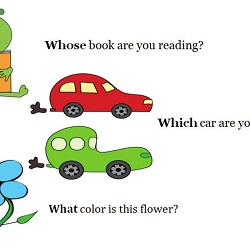
Types of adjectives used to ask questions in a sentence are called interrogative adjectives.
जिस विशेषण का प्रयोग वाक्य में प्रश्न का बोध कराने के लिए किया जाता है वह प्रश्नवाचक विशेषण कहलाता है I
Examples
1) Which pen is black?
1) कौन सा पेन काला है?
2) Whose book is this?
2) यह पुस्तक किसकी है?
7) Possessive Adjectives (अधिकार सूचक विशेषण)
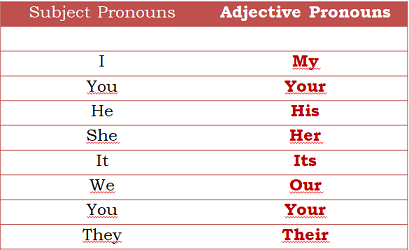
Possessive adjectives are used to show possession or relation.
जिस विशेषण का प्रयोग अधिकार या संबंध बताने के लिए किया जाता है, वह possessive adjective कहलाता है I
Examples
1) This is my book.
1) यह मेरी किताब है।
2) That is your pen.
2) वह तुम्हारी कलम है।
8) Emphasizing Adjective (बल सूचक विशेषण)
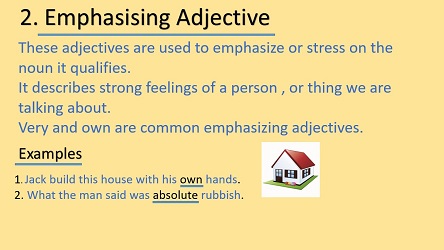
Types of adjectives used to emphasize the nouns they modify are called emphasizing adjectives.
जिस विशेषण का प्रयोग वाक्य में किसी संज्ञा पर विशेष दबाव डालने के लिए किया जाता है उसे हम emphasizing adjectives कहते है I
Examples
1) I saw him with my own eyes.
1) मैंने उसे अपनी आँखों से देखा I
2) This is the very book I used to read a lot.
2) यह वही किताब है जिसे मैं बहुत पढ़ता था।
9) Proper Adjectives (व्यक्तिवाचक विशेषण)
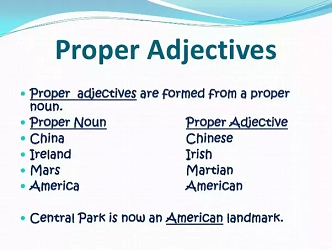
Adjectives made from proper nouns are called proper adjectives.
Proper noun से बने adjective को proper adjective कहते है I
Examples
1) I am an Indian.
1) मैं एक भारतीय हूँ।
2) He is a Canadian student.
2) वह कनाडा का छात्र है।
10) Exclamatory Adjectives (विस्मयबोधक विशेषण)
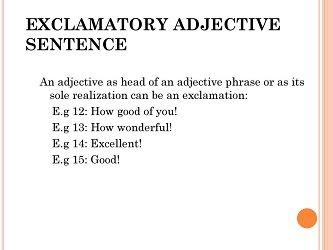
‘What’ is called an exclamatory adjective when it is used as an adjective in an exclamatory sentence.
जब 'क्या' का इस्तेमाल विशेषण की तरह किसी exclamatory sentence में होता है, तब इसे exclamatory adjective कहते है I
Examples
1) What an idea!
1) क्या विचार है!
2) What a fine day!
2) कितना अच्छा दिन है!
Degree of Comparison
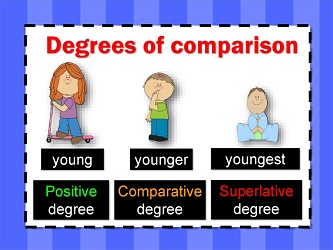
Degree of adjective is also called degree of comparison. It is used to compare nouns or pronouns.
Degree of adjective को degree of comparison भी कहा जाता है | इसका प्रयोग nouns या pronouns की तुलना करने के लिए किया जाता है I
Examples
1) Ram is tall.
1) राम लम्बा है I
2) Ram is taller than Shyam.
2) राम श्याम से लंबा है I
3) Ram is the tallest.
3) राम सबसे लंबा है I
Positive Degree
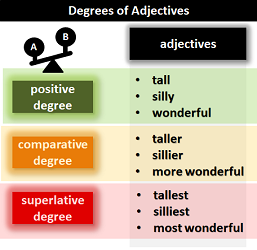
There is a positive degree when an adjective is not compared with anyone in its use and only gives sense of the common quality, shape, colour and state of nouns or pronouns.
जब किसी adjective का प्रयोग में किसी से तुलना न हो एवं वह केवल nouns या pronouns की समान्य गुण, आकार, रंग एवं अवस्था का ही बोध कराता हो तो वहाँ positive degree होता है I
Examples
1) He is tall.
1) वह लम्बा है।
2) Ramu is an intelligent boy.
2) रामू एक बुद्धिमान लड़का है।
Comparative Degree
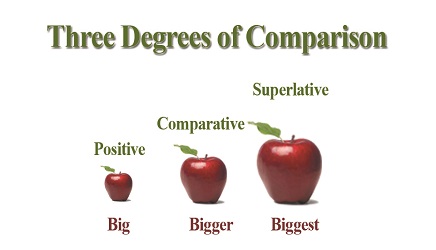
When an adjective is used to compare two nouns or pronouns, then such adjective is used in comparative degree.
जब किसी adjective का प्रयोग दो nouns या pronouns की आपस में तुलना करने के लिए की जाती है तो ऐसे adjective का प्रयोग comparative degree में होता है I
Examples
1) He is better speaker than she.
1) वह उससे बेहतर वक्ता हैं।
2) Geeta is more beautiful than Sita.
2) गीता सीता से भी अधिक सुन्दर है।
Superlative Degree
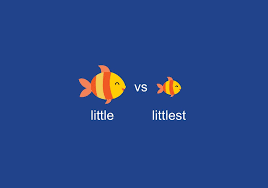
When an adjective is to compare two or more nouns or pronouns with another person, thing or place, then there is the use of superlative degree.
जब किसी adjective का दो या दो से अधिक nouns या pronouns की तुलना किसी अन्य व्यक्ति, वस्तु अथवा स्थान से करना हो तो वहाँ superlative degree का प्रयोग होता है I
Examples
1) She is the most beautiful girl of my school.
1) वह मेरे स्कूल की सबसे खूबसूरत लड़की है।
2) I am the best at mathematics in my class.
2) मैं अपनी कक्षा में गणित में सबसे अच्छा हूँ।
PRACTICE EXERCISES
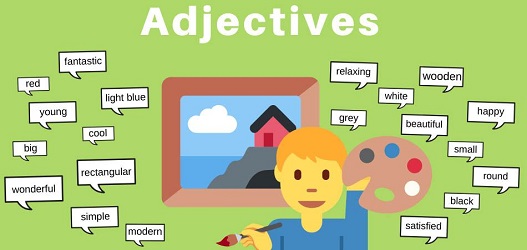
Q1. Fill in the blanks with appropriate adjectives from the brackets.
1) I often get …………………. in new social situations. (nervous/shyly)
2) I am …………………. around new people. (confident/easily)
3) I often feel …………………. before a party. (excited/nervously)
4) I feel …………………. when I’m nervous. (uncomfortable/fast)
5) I try to be a …………………. person, (nicely/friendly)
6) I tell jokes …………………. (bad/well)
7) I give my opinion when I feel …………………. about something. (strong/strongly)
8) I hope other people think I look …………………. (attractive/confidently)
9) I like people who are …………………. than I. (taller/tall)
10) It’s never a problem for me to remember people’s names. I do that ……………. (easily/automatic)
ANSWER: 1) Nervous
2) Confident
3) Excited
4) Uncomfortable
5) Friendly
6) Well
7) Strongly
8) Attractive
9) Taller
10) Easily
Q2. Fill in the blanks with the correct form of degree of the adjectives given in brackets.
1) Nadira was the most ………. girl that Salim had ever seen. (beautiful)
2) I have not seen any child that is ……………. than Sharvilak. (naughty)
3) To preach is ……. than to practise. (easy)
4) These lights are……. than those ones. (bright)
5) Hollywood movies are gory but not as…………. Bollywood movies. (interesting)
6) Mumbai is much………… than any other city in Maharashtra. (busy)
7) Who is the………… actress according to you? (pretty)
8) I think, this cloth is ………………. that we purchased earlier. (fine)
9) Autumn is the ……………… season that I have ever loved. (lovely)
10) Living in Bangalore is …………… than living in Hyderabad. (expensive)
ANSWER: 1) Beautiful
2) Naughtier
3) Easier
4) Brighter
5) Interesting as
6) Busier
7) Prettiest
8) Finer
9) Loveliest
10) More Expensive
MORE PRACTICE EXERCISES
Choose the right word from within the brackets.
1) He is cleverer ____________ me. (than, to)
2) He is senior ____________ me by five years. (than, to)
3) Reeta is thew most intelligent ____________ all the students of the class. (than, of)
4) Choose the ____________ (better, best) of the two.
5) Uttar Pradesh is the ____________ populated state of India. (more, most)
6) Make ____________ noise. (little, less)
7) Shabana is the ____________ painter of the two. (good, better)
8) You are junior ____________ me. (than, to)
9) Health is ____________ than wealth. (better, best)
10) The Taj Mahal is one of the ____________ beautiful building in the world. (more, most)
ANSWER: 1) Than
2) To
3) Of
4) Better
5) Most
6) Less
7) Better
8) To
9) Better
10) Most
Complete the following sentences using the correct degree of the adjective given in the brackets.
1) My brother’s handwriting is ___________ (bad) mine.
2) Health is ___________ wealth. (important)
3) Blood is water. ___________ (thick)
4) Everest is ___________ peak in the world. (high)
5) This is ___________ play I have ever heard on the radio. (interesting)
6) Susie is ___________ of all the four sisters. (beautiful)
7) The planet Mars is ___________ from the earth than the satellite Moon. (far)
8) The elephant is. ___________ animal in the world. (large)
9) An ocean is certainly ___________ a sea. (big)
10) I am ___________ in cricket than in football. (interested)
ANSWER: 1) Worse than
2) Is more important than
3) Thicker than
4) The highest peak
5) The most interesting
6) The most beautiful
7) Farther
8) The largest
9) Bigger than
10) Most interested